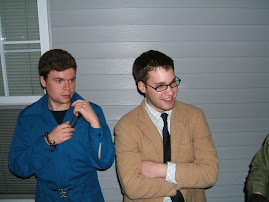Reece exhibits a sympathetic mindset when he is discusses how wolves used to be killed on sight by miners. They saw the wolves as serving no purpose for them. Reece explains how the deer population soared due to the lack of wolves to hunt them. These extra deer devastated the vegetation in the area. For me, this shows Reece being able to see how nature encompasses all lifeforms to work and exist. Reece is also showing that he is aware of this and can see a certain beauty and usefulness in even predators.
Reece also displays a sympathetic mindset when he discusses how the topsoil is not being saved during the mountain top removal of Lost Mountain. He sees topsoil being removed by bulldozers in hours while it will take thousands of years just for it to return. This again shows Reece thinking past his own time on Earth and showing caring for the long term. He is also seeing himself connected to nature rather than ignoring it. The workers don't seem to see the damage they are doing, but rather just see it as doing their job they are paid to do. Reece even later discusses how a mountain can be considered a single organism...or even nature as a whole as a single organism.
"While that sense of kinship among all living things can be explained scientifically through molecular science, it will only be a force for change, a moral change, if it is understood by the individual. No one wants to be told what to do: turn off lights, drive less, recycle. But if a desire to change the way one consumes limited resources comes out of an inner conviction, a deep feeling of conscience, then it is not too late for a real transformation of our culture." (241-242)
This section really sums up the book for me. The only way we can help the environment is to care. People won't act if they are just told to do something. They must actually care and want to do it. Ignorance cannot be used as an excuse for not acting. This book seems to aim at opening the eyes of people. One individual may not be able to turn around the world alone, but millions, even billions of individuals doing small things can help the environment. They just have to care enough and feel a part of nature to do so.
One small action done countless times changes the world. I just hope that action is for the better.
"While that sense of kinship among all living things can be explained scientifically through molecular science, it will only be a force for change, a moral change, if it is understood by the individual. No one wants to be told what to do: turn off lights, drive less, recycle. But if a desire to change the way one consumes limited resources comes out of an inner conviction, a deep feeling of conscience, then it is not too late for a real transformation of our culture." (241-242)
This section really sums up the book for me. The only way we can help the environment is to care. People won't act if they are just told to do something. They must actually care and want to do it. Ignorance cannot be used as an excuse for not acting. This book seems to aim at opening the eyes of people. One individual may not be able to turn around the world alone, but millions, even billions of individuals doing small things can help the environment. They just have to care enough and feel a part of nature to do so.
One small action done countless times changes the world. I just hope that action is for the better.

I wonder if there is time for the conversion of all individuals to caring and kinship. If not, then we have to consider what to do to make changes happen, such as laws.
ReplyDelete